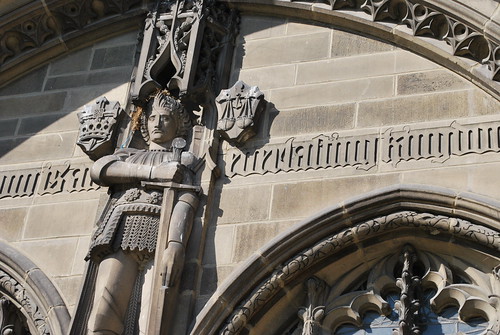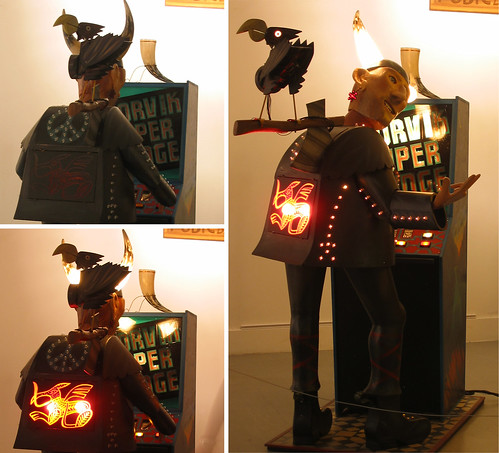Which is why it perhaps shouldn't surprise us to learn that he is solid on the topic of ghosts, as I learned on a recent visit to Los Angeles's Museum of Jurassic Technology, whose modest but satisfying bookshop features a limited edition hardcover of a 1999 reprint of Defoe's 1729 compilation The Secrets of the Invisible World Disclosed (An Essay on the History and Reality of Apparitions). There's something rewarding on almost every page. Here, let's play a bit of sortes defoeiana--page 223:
Thus if the invisible Spirits give a due alarm, they do their part; if they jog us and awaken us in a deep sleep, and pull us again and again, and give us notice that something is coming, that some Danger is at the Door; if we will sleep on 'till it comes, if we will go on, happen what happen may, the kind Spirit has done its Duty, discharg'd its Office, and if we fall into the Mischief, the fault is our own, we can by no means blame the insufficiency of the Notice, and say, to what purpose is it? feeling we had due and timely warning, but would not take the hint; we had due notice of the danger, and would not step out of the way to avoid it; the fault is wholly our own.Two important notes to help you enjoy that passage to the utmost:
1 Remember that in the facsimile of the 1729 edition, every "s" that isn't capitalized or ending a word looks more like a cursive f.
2 Stop for a moment to think about just how uncannily like Javier Marias's inimitable style the back-and-forth run-on of that narrative self-argument sounds.
Anyway, today what I've happened on is the tale of an apparition sent, it seems, to warn James IV of Scotland not to continue to make war on England. The entreaty failed; the outcome was the Battle of Flodden, which cost James his life and Scotland its last real hope of independence. Defoe writes that James was at his palace in Linlithgow when an "antient" man with "Hair the Colour of Amber, (some Accounts would represent it as a Glory painted round a head by the Limners)" forced his way through the crowd, and
came close up to the King, and, without any Bow or Reverence made to his Person, told him with a low Voice, but such as the King could hear very distinctly, That he was sent to him to warn him, not to proceed in the War which he had undertaken at the Sollicitation of the Priests, and in Favour of the French; and that if he did go on with it he should not prosper. He added also, that he should abstain from his Lewd and Unchristian Practices with wicked Women, for that if he did not, it would issue in his Destruction.After reiterating that the people and the king were convinced that the speaker was an angel because they didn't see or feel him making his way out after delivering his message--which is entertaining because of the way it calls in physical evidence to support a claim for the supernatural--Defoe laments that James ignored the warning, pressing ahead with his army to the Tweed, the traditional boundary between the kingdoms.
Having deliver'd his Message, he immediately vanish'd, for tho' his pressing up to the King had put the whole Assembly in disorder, and that everyone's Eye was fix'd upon him, while he was delivering his Message to the King; yet not one could see him any more, or perceive his going back from the King; which put them all into the utmost Confusion.
But the angel wasn't through with James, Defoe tells us. As the king sat drinking wine "very plentifully" in a hall in Jedburgh, he was accosted by the messenger yet again,
tho' not in the Form which it appear'd in Lithgo; but with less regards or respect to the Prince, and in an imperious Tone told him, he was commanded to warn him not to proceed in that War, which if he did, he should lose not the Battel only, but his Crown and Kingdom: and that after this, without staying for any Answer, like the Hand to King Ahasuerus, it went to the Chimney, and wrote in the Stone over it, or that which we call the Mantle-piece, the following Distich,I was raised, like Shakespeare, with little Latin and less Greek, so I'm forced to turn to Google Translate for help on the Ahasuerus-style mantlepiece warning:
Laeta sit illa dies, Nescitur Origo secundi
Sit labor an requies, sic transit gloria Mundi.
Proud to be that day, do not know the origin of the secondI'm going to guess that "do not know the origin of the second" really means something like "does not think of the life to come."
Let there be toil or rest, so passes the glory of the world.
Alas, the warning was not heeded: as Defoe writes,
that he marcht on, fought the English at Flodden-Field, and there lost his Army, all his former Glory, and his Life, is also recorded; I need say no more of it.Defoe goes on to speculate a bit about the spirit's origins, building his speculation on his accumulated store of tales of apparitions:
Had it been a Heavenly Vision, 'tis more than probably it would have laid hold of the King's Hand, as the Apparition of Angels did to Lot, and as it were dragg'd him away, and said You shall not go forward, that you may not be defeated and slain, both you and your Army.After offering a few reasonably convincing arguments as to why the spirit couldn't be the devil (the devil loves war and death and thus wouldn't send an emissary to prevent them), Defoe essentially throws up his hands: It's a spirit, probably of someone deceased with some sort of stake in the outcome, and we can't know more.
As a fan of Dorothy Dunnett, and particularly of her House of Niccolo series, I can't help but come up with a different answer. The eight books of the House of Niccolo series end in 1483, five years before James IV took the throne. But throughout the series Niccolo spends substantial time and energy on James's father and his dangerously wild siblings and family, trying to instill in him the wisdom and control required of a good king. Is it so hard to imagine that Niccolo, though essentially retired from meddling in affairs of state, saw the disaster of Flodden approaching and came up with one of his typically convoluted schemes in hopes of preventing it?




